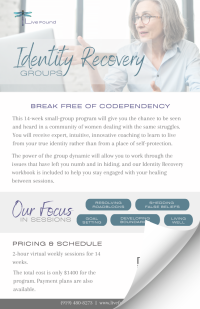Note: This is a partial adaptation of a presentation I gave at the 2023 AACC Know Hope World Conference. A quick disclaimer: I occasionally work with men who have been emotionally abused, and the impact is as devastating to them as it is to women. However, for the sake of simplicity, I often refer to the victim in feminine terms, but you could just as easily substitute masculine.
Understanding NVS: A Comprehensive Overview
Definition of Emotional Abuse
Our working definition of emotional abuse is that it is an ongoing pattern of selfish, destructive behaviors used to gain and maintain control over their spouse for one’s own benefit at the expense of their spouse. Underlying this pattern of behavior is a strong sense of entitlement to use others regardless of the cost to them.
Adverse Effects of Emotional Abuse
The list below represents many of the adverse issues victims of emotional abuse experience. Each item, if experienced on its own, might not necessarily be complicated to treat. But narcissistic, emotional abuse eventually culminates in a very complicated case of un-health. The soul-crushing experience of being dismissed, unheard and unseen, belittled, and silenced culminates in becoming a dead man walking.
- Bi-polar, Borderline, or other Axis II disorders
- PTSD or C-PTSD
- Anxiety and Depression
- Psychosomatic issues and a host of physical/medical diagnoses
- Inability to cope, maladaptive coping mechanisms
- Poor self-image, self-esteem, and self-efficacy
- Confusion, anger, and shame
- Fear of exposure, paranoid about what people “know”
- Fear of abandonment, attachment issues
- Isolated and alone
- Voiceless, unheard, misunderstood, and misjudged
- Inadequate (too much and not enough)
- Spiritually doomed, unacceptable to God
Daily Experience of Victims: Oppression from Every Angle
Take free will out of the picture, and love ceases to be love. I could preach a sermon about that, but marinate on this. The whole point of life where eternity hangs in the balance is the free choice to surrender to God vs. do what is right in our own eyes. Without FREEDOM TO CHOOSE, there is no meaning. That is true for being in a relationship with God, and in a relationship with others.
Relational Coercion in Narcissistic Victim Syndrome
If I ask my clients to give me a word to describe their marriage, I get words like: Disconnected. Lonely. Isolated. Hell. Dangerous. Chaotic. Unsafe. Manipulative. Hopeless. I think all these words could boil down to “oppressed.” In an emotionally abusive marriage, it’s not that they argue, yell or scream violently, or act selfishly in and of itself. It is that one person bullies the other into an isolated, disconnected, voiceless box. The bully gives the other no voice and no choice.
Compliance and Connection in Marriage
Culture, society, religion, and parents taught us as children that the highest form of perfection was compliant obedience. The “favorite” was the kid who never disrupted, never questioned, never hesitated to obey.
As an adult trying to be in a marriage, compliance does not build connection. There is no reciprocity, mutuality, or freedom. When she acts out of her own sense of self — her own ideas, thinking, perceptions- her husband opposes, fights against, constrains, and silences her. As long as what she wants coincides with what he wants, things may look fairly peaceful. She may even find it her honor to “make him happy” and wrap her life around keeping his life running smoothly.
Emotional Abuse and Identity Crisis
Emotional abuse assaults her perception of reality. She has been taught to question her own reality–constantly wondering if she’s seeing this right, or if she is crazy, or if she is the abuser. Even the church environment teaches that she cannot trust her intuition or her heart. She questions her own needs, having been repeatedly told she is simply too sensitive. If she’d just stop being so picky or judgmental, all of this is fine. She’s trained to believe that any neediness is wrong, and that she has no right to ask for anything, including asking for being treated with kindness and courtesy. Relationally, the bullying silences her. Made small, she becomes an extension of him. Her personhood is unnecessary… She fills a role, not a connection.
Communication Breakdown in Abusive Relationships
If she brings up concerns, her spouse dismisses, belittles, ignores, or rages. Rather than listen, he takes offense to them, as if she is criticizing him rather than expressing a concern. He’ll argue about her approach, how she said it, what she should have said instead, what the words she used really meant, and why he can’t hear her… Anything but work to understand the point she is seeking to resolve. Every concern easily offends him. He uses anger as a weapon to get what he wants, and she is then managed down to silence.
Misplaced Responsibility and Self-Blame
He misplaces his responsibility to show up differently. Common themes he’ll use are:
- I’ll never be good enough for you.
- Your standards are impossible.
- You have unrealistic expectations
- I’m sorry you feel that way.
- The Bible says you should ______.
- If you would just forgive me…
All these statements make HER the problem. It’s her expectations, her feelings, her standards, her inability to come up with a better plan that are the issue, not him being a jerk.
Sexual Coercion in Emotional Abuse
Emotional abuse also assaults a person’s identity, worth, and value. I think this might be most poignantly felt in the sexual relationship, where he determines her value by how often she engages sexually. A spouse is expected, coerced, or demanded to participate sexually with little relationally connected context. (And often with exactly the opposite – a volatile, insecure, and threatening context!) We see men in particular exhibiting a strong sense of entitlement to a woman’s body, regardless of the chaos she is emotionally feeling because of his treatment. He uses physical force, scriptural manipulation, shame, and blame to keep her sexually engaging with him, where it very often turns into abuse, rape, or non-consensual sex.
Her reticence puts her in the crosshairs of blame for his porn addiction, his wandering eyes, or his multiple affairs. The sexual act is demanded of her, and if she is reluctant, she pays a steep price through silent treatment, anger, and some sort of retribution when she won’t or can’t respond. The dissonance is compounded when physical touch is used violently – either altogether withheld or to cause pain and fear. Instead of being a bonding experience, sex becomes a weapon. She doesn’t feel loved or held, she feels used and rejected and diminished. Again, she is filling a role, not building a connection. Abusers kill the sense of desire they are demanding their spouse give them.
Spiritual Coercion in Narcissistic Victim Syndrome
Emotional abuse is an assault against her soul. When God saw that it was not good for man to “be alone,” He created woman as an ezer kenegdo to be that companion. But, this word translated into “helper” is way more powerful than simply an extension of him, a supporting role that keeps his home neat, his children obedient, his belly fed and his bed warm. It is a word only otherwise used in Scripture to refer to the Holy Spirit who “helps” at a man’s greatest point of need in the heat of a battle when he is at a loss to save himself. It’s actually a powerful position of life-giving influence, not simply a “supportive” role.
Misuse of Scripture to Perpetuate Abuse
I see people who use the Bible as a weapon to coerce their spouse to be who they decide she or he will be. The spouse is shamed into sitting down, shutting up, and doing what they’re told. He may use the Bible to get his wife to shape up and obey him under the guise of “respect” and “submission.” It is her duty to God to “honor her husband” and what “honors” him is what he decides it to be. She is used, not cherished. Commanded, not invited.
Control and Isolation in Spiritual Abuse
Spiritual abuse also looks like claiming authority over an individual’s right to make decisions about life in general, including roles, friends, schedule, money, etc. They decide who her friends are, how much time she can spend with them, what her household duties are, and what she gets to wear, how she presents herself to the world. And when they are irritated or don’t like what they’re getting, they call her names, dismiss her attitude, her tone, or desires as disrespectful to him and constantly use that as an excuse to berate, ignore, and bully their wives. And, she is taught that she is doing something sinful and evil if she brings the abuse and bullying to light or tries to confront it in some way. Again, the victim has no voice and no choice. Her contribution to the world has no substance worth considering, only using.
Shaming and Silencing Tactics
He uses her values to shame her into shutting up or doing what he wants. He’ll tell her she’s “breaking her vows” or “breaking up the family” when she talks about how they’re headed for divorce, rather than acknowledge any of his behavior that has already broken those vows. He’ll call her a gossip… accuse her of cheating or of turning the kids against him… he’ll call her foolish and disrespectful. And so she’ll get in line and quit talking about a separation or divorce, excusing his bad behavior.
Isolation and Control Over Relationships
The world starts to feel really small. She becomes isolated from her friendships and family members. He finds ways to control those relationships so she is not free to get deeper than the façade he seeks to maintain. She doesn’t stand up for herself; terrified of losing her kids because he smears her name, mocks her parenting, or threatens to alienate them when he doesn’t like her behavior. Her boundaries are called “disrespect” or “silent treatment” or “unsubmissive,” and she knows she has no room to say no or to stand up for herself.
Impact on Decision-Making
She doesn’t know what her options are. Her life is dictated by whatever happens in their marriage, rather than taking up the space God intended for her. Her feelings of safety or security are dependent on his moods. She doesn’t make decisions about the future for fear of how it will affect him or the marriage. This lack of personal agency and autonomy is a hallmark of emotional abuse and further entrenches the victim in a state of confusion, helplessness, and despair.
Next Steps: The Path to Recovery
In conclusion, understanding and recognizing Narcissistic Victim Syndrome is crucial for both victims and those supporting them. It involves acknowledging the multifaceted nature of emotional abuse and its pervasive impact on every aspect of a victim’s life. Recovery begins with reclaiming one’s voice and choice, breaking free from the oppressive patterns of control, and rebuilding a sense of self-worth and autonomy. Support systems, including therapy, support groups, and a compassionate community, play a vital role in this healing journey.
We would love to help you help your clients define a path forward!


